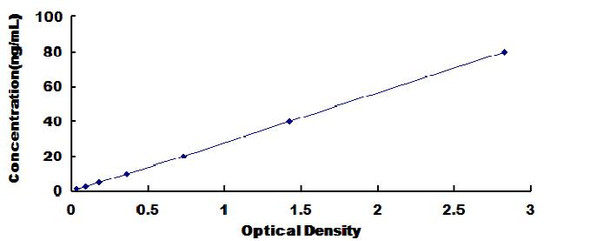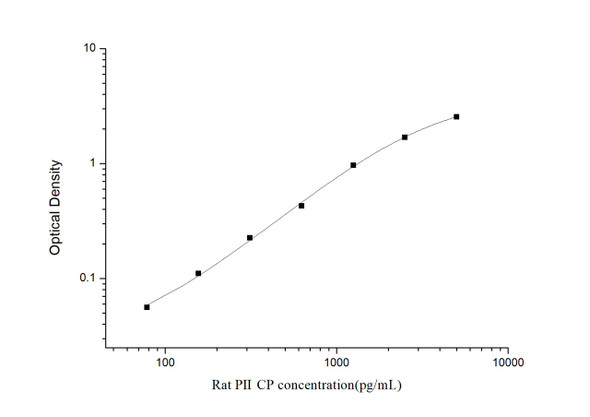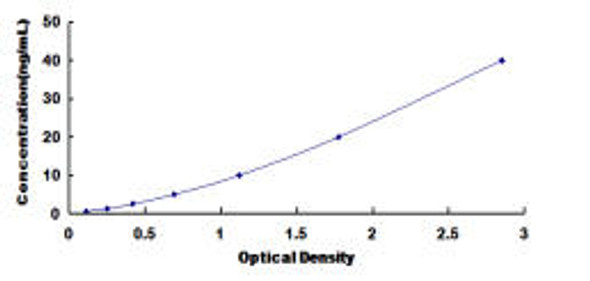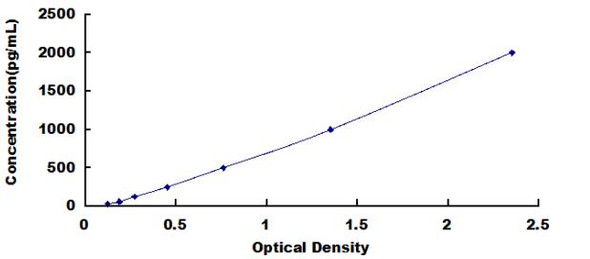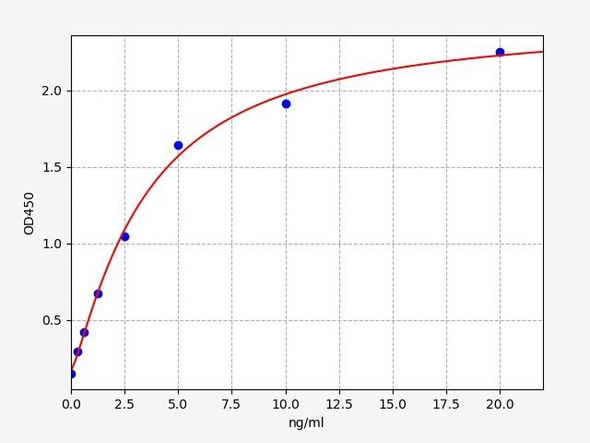Rat PⅠCP (Procollagen Ⅰ C-terminal Propeptide) ELISA Kit
- SKU:
- AEES00507
- Product Type:
- ELISA Kit
- ELISA Type:
- Sandwich
- Size:
- 96 Assays
- Reactivity:
- Rat
- Sensitivity:
- 0.75 ng/mL
- Range:
- 1.25-80 ng/mL
- Sample Type:
- Serum, plasma and other biological fluids
Description
Rat PⅠCP (Procollagen Ⅰ C-terminal Propeptide) ELISA Kit
The Rat PⅠCP (Procollagen Ⅰ C-terminal Propeptide) ELISA Kit is a specialized tool designed for the precise quantitative measurement of Procollagen Ⅰ C-terminal Propeptide levels in rat biological samples. Procollagen Ⅰ C-terminal Propeptide is a crucial marker associated with collagen synthesis and extracellular matrix turnover, particularly in processes related to collagen formation and tissue repair. It serves as an indicator of collagen synthesis activity and plays a significant role in maintaining connective tissue structural integrity and homeostasis. Accurate determination of Procollagen Ⅰ C-terminal Propeptide concentrations using this ELISA kit provides valuable insights into collagen metabolism, connective tissue remodeling, and bone formation processes.
Researchers can leverage this kit to explore various physiological and pathological conditions where collagen synthesis and tissue regeneration are vital, ranging from wound healing and bone remodeling to fibrotic diseases and osteoporosis. The Rat PⅠCP ELISA Kit from Assay Genie boasts exceptional sensitivity and specificity, ensuring precise and reproducible results. Manufactured under strict quality control standards, this kit delivers reliable performance and ease of operation, making it an ideal choice for research studies aimed at investigating collagen metabolism dynamics and their implications in health and disease.
| Product Name: | Rat PⅠCP (Procollagen Ⅰ C-terminal Propeptide) ELISA Kit |
| Product Code: | AEES00507 |
| Assay Type: | Sandwich |
| Format: | 96T |
| Assay Time: | 3.5h |
| Reactivity: | Rat |
| Detection Range: | 1.25-80 ng/mL |
| Sensitivity: | 0.75 ng/mL |
| Sample Type & Sample Volume: | Serum, plasma and other biological fluids, 100μL |
| Specificity: | This kit recognizes Rat PⅠCP in samples. No significant cross-reactivity or interference between Rat PⅠCP and analogues was observed. |
| Reproducibility: | Both intra-CV and inter-CV are < 10%. |
| Application: | This ELISA kit applies to the in vitro quantitative determination of Rat PⅠCP concentrations in serum, plasma and other biological fluids. |
This ELISA kit uses the Sandwich-ELISA principle. The micro ELISA plate provided in this kit has been pre-coated with an antibody specific to Rat PⅠCP. Standards or samples are added to the micro ELISA plate wells and combined with the specific antibody. Then a biotinylated detection antibody specific for Rat PⅠCP and Avidin-Horseradish Peroxidase (HRP) conjugate are added successively to each micro plate well and incubated. Free components are washed away. The substrate solution is added to each well. Only those wells that contain Rat PⅠCP, biotinylated detection antibody and Avidin-HRP conjugate will appear blue in color. The enzyme-substrate reaction is terminated by the addition of stop solution and the color turns yellow. The optical density (OD) is measured spectrophotometrically at a wavelength of 450 nm ± 2 nm. The OD value is proportional to the concentration of Rat PⅠCP. You can calculate the concentration of Rat PⅠCP in the samples by comparing the OD of the samples to the standard curve.
| Kit Components: | An unopened kit can be stored at 2-8℃ for 1 month. If the kit is not supposed to be used within 1 month, store the components separately according to the following conditions once the kit is received.
|
| 1. | Add 100μL standard or sample to the wells. Incubate for 90 min at 37°C |
| 2. | Discard the liquid, immediately add 100μL Biotinylated Detection Ab working solution to each well. Incubate for 60 min at 37°C |
| 3. | Aspirate and wash the plate for 3 times |
| 4. | Add 100μL HRP conjugate working solution. Incubate for 30 min at 37°C. Aspirate and wash the plate for 5 times |
| 5. | Add 90μL Substrate Reagent. Incubate for 15 min at 37°C |
| 6. | Add 50μL Stop Solution |
| 7. | Read the plate at 450nm immediately. Calculation of the results |




